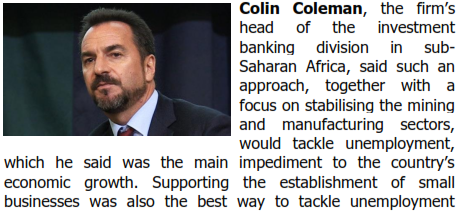CHAPTER 15
SA should invest in small business to hit 5% growth

Ploughing investment into the small business sector is the only way to boost growth, says Goldman Sachs.
South Africa’s economy can grow by 5% over the next five years if government and the private sector invest R12bn in 300 000 new small businesses.
According to global securities firm Goldman Sachs, this should be coupled with recruiting and skilling 300 000 unemployed youths through the SA National Defence Force’s national youth service programme – government’s new project to contain spiralling youth unemployment.

because the sector created the highest number of new jobs to absorb idle youth.
The ANC-led alliance earlier this year called for government to expedite the controversial national youth service programme – which has split opinion among commentators on whether it should be compulsory – and to begin recruiting unemployed youths from June next year.
Coleman, who discussed the findings of the report with Finance Minister Nhlanhla Nene before making it public this week, said that while a financial crisis was unlikely in the near future, the business sector’s biggest fear was social unrest similar to the Arab Spring.
This, said Coleman, was the sentiment shared by most businessmen in research that spanned more than four months of interaction with the country’s captains of industry.
At a briefing with business leaders in Johannesburg on Wednesday, Coleman said South Africa’s saving grace was its depth of financial markets, low levels of dollar-denominated debt, respected institutions such as the SA Reserve Bank and Treasury, and high reporting and transparency standards, which were key indicators in the event of a looming financial crisis.
The report, titled South Africa’s Economic Management and Leadership, warned, however, that a lack of political leadership and decisiveness, a 41.5% debt-to-gross domestic product (GDP) ratio, similar to that of 1994, and failure to restructure the unproductive alliance between labour federation Cosatu (as the representative of civil servants) and the ANC (as the employer in government) had created a public sector consumed by salaries but not offering value for money.
Government said it was aware of the “structural” problems in the tripartite alliance, where unions were too focused on increasing salaries while refusing to be monitored or evaluated by the ANC-led government.
While South Africa’s debt-to-GDP ratio went down to almost 20% at the end of Thabo Mbeki’s presidency in 2008, it rose sharply to 41.5% this year.
Goldman Sachs estimates that the ratio could rise to 49% by 2017 as a result of government having to find $11bn (R157bn) to fund the 3.9% deficit, which will place South Africa close to the uncomfortable 50% debt-to-GDP threshold, seen by the World Bank as a precursor to a financial crisis.
Coleman presented two scenarios that the government, business and labour sectors could follow to improve economic growth by either 3.2% or 5% within five years of implementation.
Treasury, said Coleman, would be forced to seek a bailout from the International Monetary Fund within two years if foreign direct investment and foreign portfolio investment came to a “sudden stop”, within 18 months if “social unrest” turned into an Arab Spring, and within six months if the “Armageddon” of financial crises happened – where all foreigners sold everything they owned in South Africa, which would result in the introduction of capital controls.
Unemployment, reported at 25% last month, was one of the highest in the world in emerging market countries.
But recruiting 300 000 unemployed youths annually for five years into the national youth service programme for skills training could see that figure reduced by 10% within five years, said Coleman.
He predicted that government could introduce a minimum wage of between R3 500 and R4 000 within the next 18 months.
Cosatu this week called for a decent minimum wage at its congress this week.
But Coleman warned that a minimum wage higher than Goldman Sachs’ estimates could result in job losses if it was unaffordable for the private sector.
Small business is big business for South Africa
30 March 2015
Small businesses are key to unlocking economic opportunities and achieving inclusive growth, Small Business Development Minister Lindiwe Zulu said last week at the Global Entrepreneurship Congress in Milan, Italy.
South Africa's high rate of unemployment, poverty and extreme inequality called for bold and far-sighted interventions, she said.
"As government, we remain open and receptive to new policy ideas that will help accelerate the formation of new businesses and sustainability of existing ones."
Zulu said the government's policy interventions aimed to ensure that small enterprises grew into thriving businesses: "They cannot remain small forever". She said the government would focus on providing financial and non-financial support to small businesses as it wanted to reduce obstacles to doing business wherever possible.
"There is general recognition that Africa is the next growth pole of the world. It is up to us Africans to seize the moment and ensure that Africa becomes an unprecedented economic success," Zulu said.
The Global Entrepreneurship Congress provides opportunities for entrepreneurs to explore business networking opportunities and to learn and interact with their peers across the globe. Around 4 000 delegates from 150 countries attend the gathering.
"We see the GEC as a powerful platform to learn what other successful nations are doing to promote and sustain enterprise development," said Zulu.
South Africa will be the first African country to host the GEC in 2017. The bid was awarded to Johannesburg as part of the opening ceremony at GEC 2015 in Milan.
Accepting the award on behalf of Johannesburg, Zulu said: "GEC 2017 will ensure that small business development remains firmly on the national agenda and the radar screen of all stakeholders."
SAnews.gov.za





